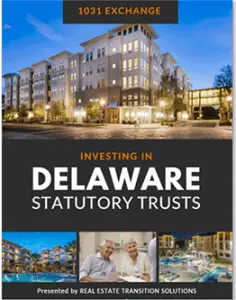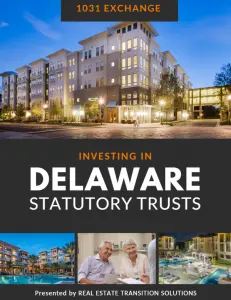Delaware Statutory Trust Property
What is a Delaware Statutory Trust?
A Delaware Statutory Trust is a legal entity designed to hold institutional investment real estate that is actively managed by professional real estate firms. DSTs allow individual investors to perform a tax-deferred 1031 Exchange into a “beneficial interest” of the trust, also referred to as a “fractional interest” in a larger property or portfolio of multiple properties. Each individual DST is property-type specific. Typically, DSTs hold the following property types: multi-family apartments, essential net-lease retail, self-storage, net-lease medical office, industrial properties, student housing, senior housing or memory care.
DST managers, also referred to as the “Delaware Statutory Trust sponsors”, acquire the DST real estate and take care of all management activities, including structuring the DST, securing the long-term financing, day-to-day management decisions, financial and tax reporting, and the ultimate sale of the DST properties.
DSTs, as we know them today, were established through the Delaware Statutory Trust Act in 1988. Beneficial interests in Delaware Statutory Trusts were approved as “like-kind” real estate by the IRS in 2004 through the release of IRS Revenue Ruling 2004-86. The revenue ruling created a much-desired option for investment real estate owners who want to defer capital gains tax on real estate investment property through a 1031 Exchange, but do not want to assume the responsibility of day-to-day management. Furthermore, the Revenue Ruling allowed individual investors to pool their capital to own larger, higher-quality properties that would be too expensive for most single investors to acquire by themselves.
- What is a Delaware Statutory Trust?
- How DSTs Work
- Benefits vs. Risks
- 1031 Exchange rules for DSTs
- 1031 Exchange options for DSTs

Features 28 pages with rules, tips, examples, and more.
How Does an Exchange for DST Real Estate Work?
Delaware Statutory Trust Pros and Cons
- DSTs are qualified 1031 Exchange properties
- Ownership requires no active management
- DST real estate tends to be high-quality “institutional” real estate
- DSTs often have low minimum investments
- Exchange proceeds can be diversified among multiple DSTs
- DST real estate has competitive potential cash flow, generally paid monthly to the owners
- DSTs have very low risk of not closing and invalidating an Exchange
* Defined by SEC as an individual with net worth (excluding primary residence) of $1,000,000+ or annual income in excess of $200,000 for last two years for an individual or $300,000 for a couple filing jointly.

- Speak with a licensed 1031 Exchange Advisor
- Discuss your potential tax liability
- Understand benefits vs. risks
- Discuss 1031 Exchange options


